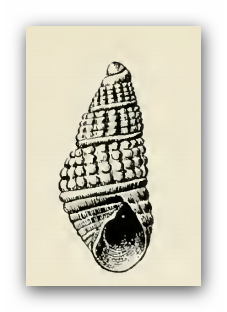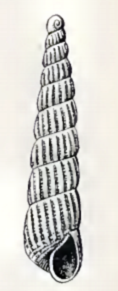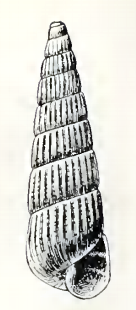
Besla excolpa is a species of sea snail, a marine gastropod mollusk in the family Pyramidellidae, the pyrams and their allies.

Odostomia promeces is a species of sea snail, a marine gastropod mollusc in the family Pyramidellidae, the pyrams and their allies.
Turbonilla almejasensis is a species of sea snail, a marine gastropod mollusc in the family Pyramidellidae, the pyrams and their allies.
Turbonilla baegerti is a species of sea snail, a marine gastropod mollusk in the family Pyramidellidae, the pyrams and their allies.

Turbonilla cabrilloi is a species of sea snail, a marine gastropod mollusk in the family Pyramidellidae, the pyrams and their allies.
Turbonilla calvini is a species of sea snail, a marine gastropod mollusk in the family Pyramidellidae, the pyrams and their allies.
Turbonilla corsoensis is a species of sea snail, a marine gastropod mollusk in the family Pyramidellidae, the pyrams and their allies.
Turbonilla dina is a species of sea snail, a marine gastropod mollusk in the family Pyramidellidae, the pyrams and their allies.
Turbonilla dora is a species of sea snail, a marine gastropod mollusk in the family Pyramidellidae, the pyrams and their allies.

Turbonilla doredona is a species of sea snail, a marine gastropod mollusk in the family Pyramidellidae, the pyrams and their allies.
Turbonilla halidoma is a species of sea snail, a marine gastropod mollusk in the family Pyramidellidae, the pyrams and their allies.

Turbonilla heterolopha is a species of sea snail, a marine gastropod mollusk in the family Pyramidellidae, the pyrams and their allies.

Turbonilla histias is a species of sea snail, a marine gastropod mollusk in the family Pyramidellidae, the pyrams and their allies.

Turbonilla ignacia is a species of sea snail, a marine gastropod mollusk in the family Pyramidellidae, the pyrams and their allies.
Turbonilla ina is a species of sea snail, a marine gastropod mollusk in the family Pyramidellidae, the pyrams and their allies.
Turbonilla lamna is a species of sea snail, a marine gastropod mollusk in the family Pyramidellidae, the pyrams and their allies.
Turbonilla larunda is a species of sea snail, a marine gastropod mollusk in the family Pyramidellidae, the pyrams and their allies.
Turbonilla lazaroensis is a species of sea snail, a marine gastropod mollusk in the family Pyramidellidae, the pyrams and their allies.
Turbonilla mariana is a species of sea snail, a marine gastropod mollusk in the family Pyramidellidae, the pyrams and their allies.
Turbonilla marshalli is a species of sea snail, a marine gastropod mollusk in the family Pyramidellidae, the pyrams and their allies.







